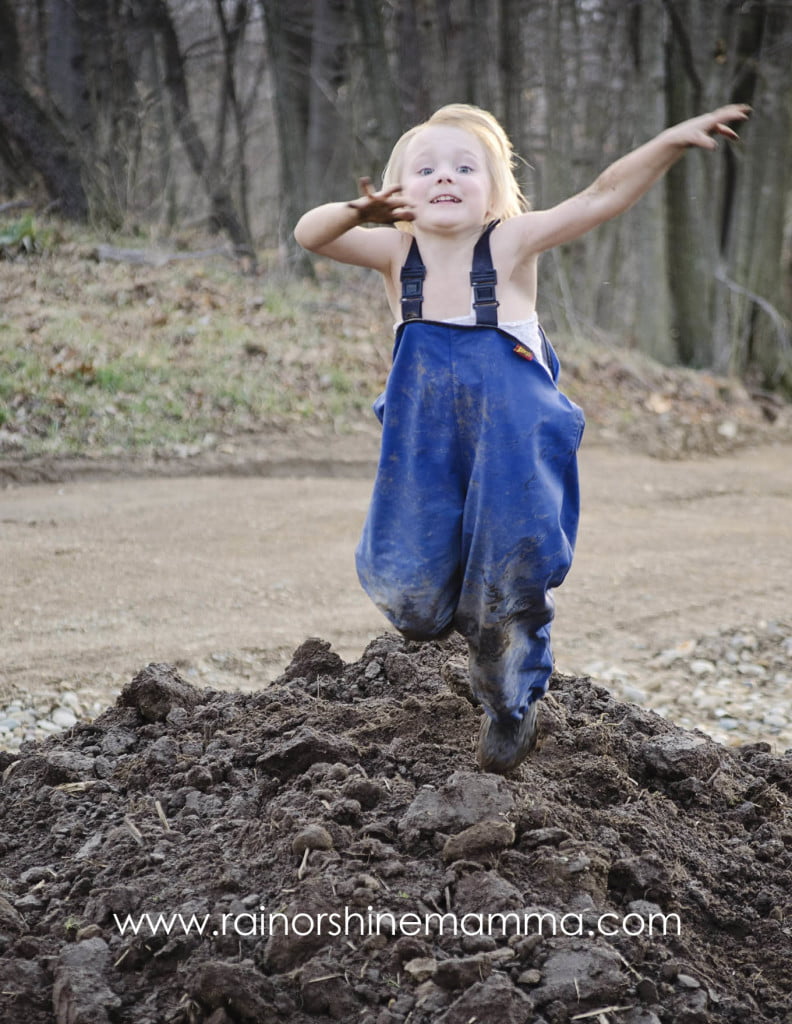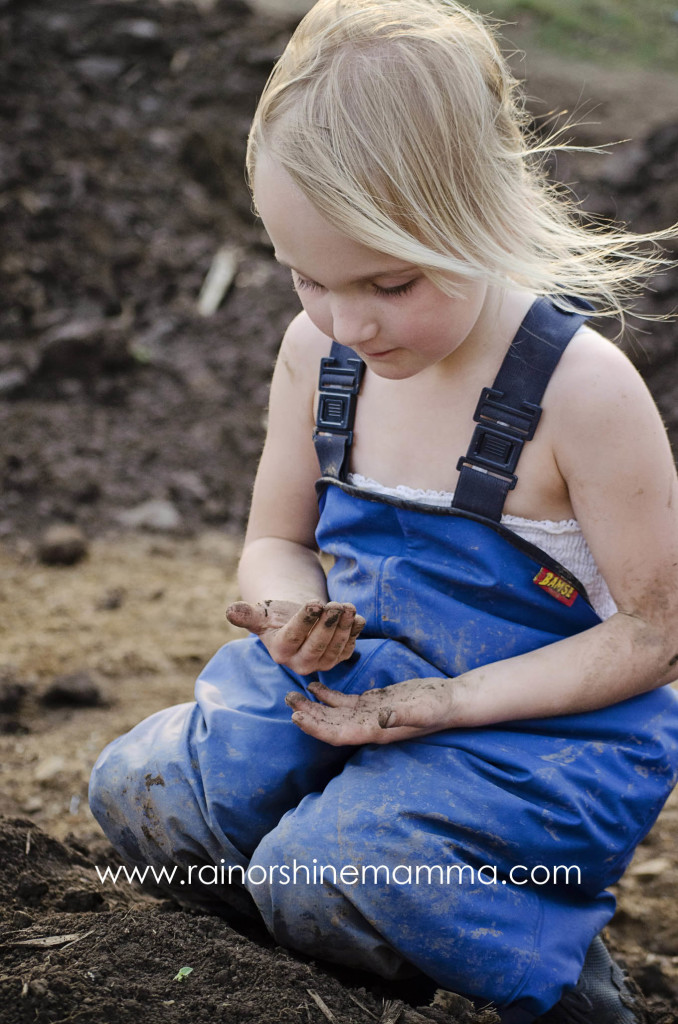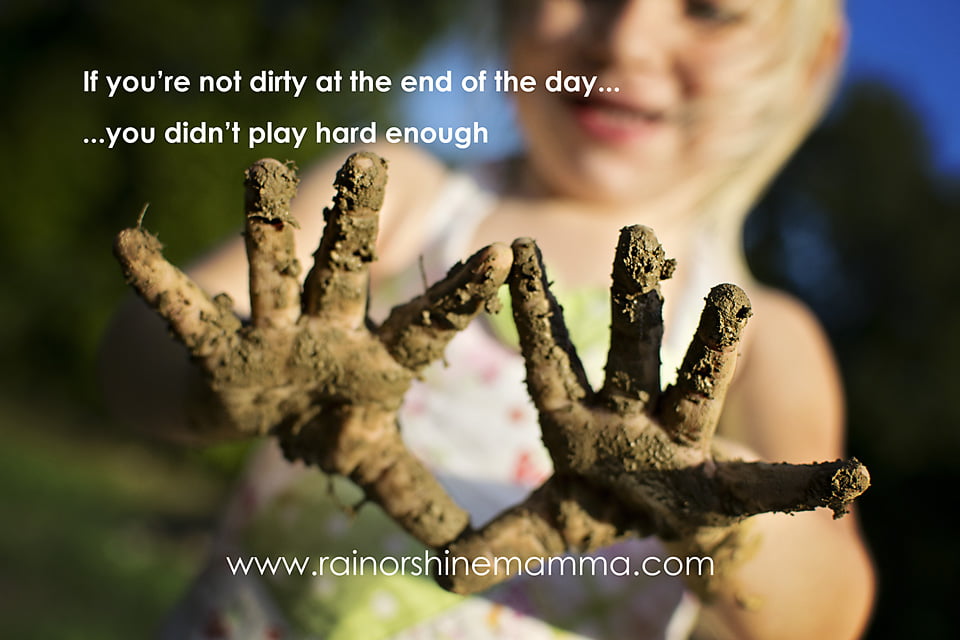Published on November 11th, 2013 Updated on January 10th, 2023 By Linda McGurk
“Lite skit rensar magen.”
Growing up in Sweden, I heard this old saying more than once. It roughly translates to “A little bit of dirt cleanses the stomach.” While I wouldn’t take this literally, researchers are finding more and more evidence for the theory that being exposed to certain microbes in the womb and early childhood strengthens our immune system and protects us from illnesses later on. Smaller family sizes, increased antibiotics use, less contact with animals, more time spent indoors, and an obsession with cleanliness have all contributed to our immune systems slacking off in the past 50 years. And when the immune system isn’t challenged enough it might start looking for things to do, like overreacting to things that aren’t really dangerous, causing allergies, asthma, eczema, childhood diabetes and inflammation later in life.
In a society where nothing is considered really clean unless it’s been immersed in Clorox, and hand sanitizer is hailed as the greatest thing since sliced bread, it turns out that maybe keeping our kids sterile isn’t so good after all.
In academic lingo, this is called the hygiene hypothesis, and it’s been around since 1989. Many studies have supported this hypothesis, most famously a comparison of children in West and East Germany before and after the fall of the Berlin Wall. The researchers were surprised to find that the children in the poorer, dirtier and less developed East were less likely to suffer from asthma and allergies than the children in the West. More recently, studies have found that Amish children have remarkably low rates of asthma and allergies. The reason? Likely what European scientists call the “farm effect.” Breathing in the microbes found in manure from cattle and other farm animals every day is beneficial to the immune system and could explain why only 7.2 percent of the Amish children in one study had an increased risk for allergies, compared to 50 percent of the general population. The Amish kids also had more siblings to pass around the germs, which means they build more immunity. And the earlier we’re exposed, the better the protection.
Of course nobody is saying that we should feed our kids dirt, stop taking showers or go back to the days when the drinking water was so filthy that people drank alcohol to stay healthy. Nor should you consider the hygiene hypothesis a valid excuse to stop cleaning your house (dangit!).
Vaccinations, antibiotics and the improvements in sanitation and personal hygiene in the industrialized world have been key to curbing outbreaks of infectious diseases and have saved a lot of lives. At the same time, our modern lifestyle has wiped out a lot of beneficial microbes, including some in our guts that help us stay healthy, and likely triggered the current epidemics of asthma and allergies. Striking a balance between ‘not clean’ and ‘too clean’ can be hard, and even the scientists don’t fully understand our complicated relationship with parasites, bacteria and viruses.
So what is a parent to do?
- Let your kids play outside as much as possible. And don’t freak out if Little Johnny gets dirty or sticks his fingers in his mouth after playing with those earthworms. Most germs in our environment are completely harmless and some are even beneficial to our health and well-being.
- Don’t pressure your doctor for antibiotics at the first sign of a cold. Chances are the infection is viral and won’t be helped by antibiotics, and overuse of antibiotics leads to drug-resistant bacteria.
- Let your child spend time with animals early on in life or, better yet, get a dog. As gross as it may sound, being around the microbes found in animal poop can help protect against allergies later in life.
- Wash hands to avoid infections, but ditch the antibacterial hand soap and non-alcoholic hand sanitizer. They don’t do anything that regular soap and water can’t take care of, and most of them contain triclosan, a harmful hormone disruptor that is believed to create bacteria that are resistant to antibiotics.
- Stop your bleach-infused house-cleaning routine. There’s no need to use the nuclear option of cleaning supplies when old-fashioned soap and water does the same job, without harming the environment and killing beneficial bacteria.
Sources: Can it Be Bad to be Too Clean? The Hygiene Hypothesis, The Scientific American; A Cure for the Allergy Epidemic?, The New York Times Sunday Review; How keeping children too clean can wreck their immune systems, The Mail Online; Is Dirt Good for Kids?, WebMD, The FDA says studies on triclosan, used in sanitizers and soaps, raises concerns, The Washington Post


It can be so easy to get swept up into the sterile world. I try and let my kids be explorers, yet I also hear my voice telling them to stop putting their hands in their months… great article!!
Yes, I agree. What really worries me is the rise of bacteria that are resistant to antibiotics. That can have some really devastating effects, so education about anti-bacterial soaps and cleaners is key. Thanks for reading!
The problem that most people don’t understand is that these new “super bugs” were created resistant to current treatments due to a obsession with cleanliness.
Thank you! I love reading this article as the boys just came in to eat lunch after being outside for an hour in 38° weather digging for worms with snot running down the 4yr olds face. I gave them a bar of soap saud clean up and let them do it. About 5 min into lunch i did look down to see my 7yr olds hands only to tell him to go wash again. They need that time as much as anything else, extra bonus I was able to see five giant worms my day is now complete! LOL
Wonderful to hear that your kids get to play outside! They’ll thank you later:o) Digging for worms is one of my girls’ favorite activities of all times as well – keeps them entertained for hours!
This is a fantastic post, and I couldn’t agree more. I used to work as an communicable disease nurse, so at times I have to quell my profession-borne instinct to wash and clean everything. Yes, I’m paranoid about germs but I also believe that frequent exposure to all things germy (within reason, of course) is healthy for my daughter. She plays outdoors all the time, goes to swimming pools, playgrounds, etc. And I refuse to bleach my house every week. My husband grew up in a household where his mother used Clorox for everything and anything, and my husband has a lot of allergies. I often wonder if he’d be less sensitive if his mom had let him (and their household) be a little more “dirty.” 🙂 Thanks for bringing light to an important topic!
Glad you enjoyed the post! I think one of the main problems is that we tend to treat all germs as “bad” even though that’s not true. The bottom line is that there are a lot of companies that are profiting immensely by fueling this fear of dirt and anti-bacterial products have really gotten a stronghold in the US. It will take a lot of education to change that but it can be done. In Sweden, for example, chlorine is no longer allowed in cleaning products due to its toxicity and because it causes bacteria to become resistant.
Yes, it is no problem to get rid of the mud on our children’s hands but the dirt that wraps our children’s soul while spending hours unsupervised on electronical appliance is hard hard work to get rid of it, if at all we can clean these things off. THIS is really woring, not some sand and mud, that are signs of joy, imagination and physical involvement with their environment .
Michaela, I agree with you. I think unlimited electronics use is one of the main reasons why fewer kids play outside today and that’s why I restrict the use of them here at home.
Absolutely! I had a that kind of childhood and I am pretty happy with it. Today when I see a 9 year old child playing with tablet, it reminds me of my time; I was probably eating dirt at that age 😀
But thanks for sharing these awesome suggestions. I guess as parents, we need to do that!
Thank you – I appreciate you stopping by!
My sister in law always took her children to the doctor for the slightest ailment even if it were only a cut hand that drew blood, she also kept her house squeaky clean. Her youngest is 16 and 2 days ago she got a virus after a cold and is now confined to hospital for a few weeks because she has lost the use of her legs and needs physio to learn to walk again. Possibly due to her weak immune system.
So sorry to hear that, Mike. I hope she will be OK.
I realize that this is an old post. However I really enjoyed reading it. I’m going through terrible anxiety right now with my two and a half year old about germs. I was never like this when he was really little. The opposite actually. I let him put things in his mouth at play groups and stuff. Then last year the two of us got hit with a brutal stomach bug and since then i am beyond paranoid. I was avoiding taking him to public places and whenever I absolutely had to I would constantly wash his hands. I’m starting to loosen up because a lot of people made me realize I’m doing more harm than good. My question is how do I find balance? So the last few days I’ve taken him to play groups and play grounds and didn’t even wash his hands afterwards. YIKES. Seems so absurd to me but now I’m obsessing that I’m turning him in to a bubble child. What is a good balance?
Yes, it’s an old post, but the content is just as true today! Exposure – to germs and other kids – is important to build immunity, but there’s a difference between beneficial germs and pathogenic germs. While the former are good for us, the latter are what lands us in the bathroom puking our guts out. Daycares, preschools and other places where a lot of children gather indoors in tight spaces are notorious for spreading disease, but interestingly research has shown that the incidence decreases the more time the children spend outside. So by seeking out outdoor activities (and maybe the playgroup that you’re talking about already is outside?) you’re already in a much better place than if you’re indoors. I highly recommend that you read Let Them Eat Dirt (aff. link), a new book written by two microbiologists who give great, detailed advice about what to do and not do when it comes to germs. I’m reading it right now and will review it on the blog in the near future. Hope this helps!
Thanks for your advice Linda. Oh I absolutely loved your page and it makes complete sense. I just meant it’s an old post so I wasn’t sure if it was active still and I would get a response. I wish I could find outdoor play groups. They are indoors at malls, schools etc :-(.
Oh yes, I’m active still:o) If there are no existing outdoor playgroups in your area, maybe you could start one? It could be worth a try! The Children and Nature Network has some good information about Family Nature Clubs; that’s a good place to start.
I run a small child care center for infants and toddlers. We’re all about dirt in any form and fashion. I am a presenter across NC for early childhood development to encourage other early childhood professionals and parents to let infants and toddlers explore the natural world. I enjoyed your article. 🙂 Keep up the good work.
Vanessa